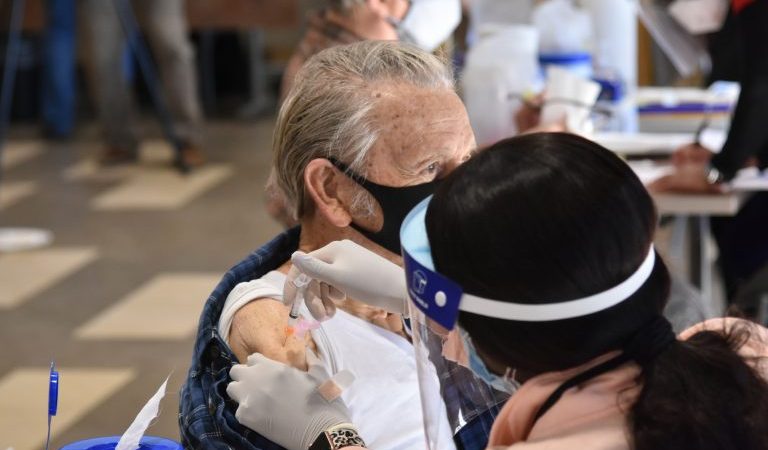‘I Don’t Know How Much Longer We Can Do This’: Alabama State Health Officer Frustrated As COVID Cases Surge
A man from Vestavia Hills receives his COVID vaccine. Less than 50% of Alabamians are vaccinated against COVID-19.
Alabama remains in the crosshairs as the COVID-19 pandemic shows no signs of relenting.
“We’re really in a crisis situation. We’ve said that over and over for several weeks,” said Alabama State Health Officer Dr. Scott Harris, in a briefing this morning. “I don’t know how much longer we’re going to be able to do this.”
Case numbers and hospitalizations continue to surge. Hospitalizations are at around 2,900, slightly below the peak in January. With a rise in deaths as well, Harris once again encouraged Alabamians to get vaccinated, especially now that the Pfizer vaccine has been granted full FDA approval.
This week was especially bad for schools. There were 5,571 cases, a 700% increase in cases for school-aged children compared to this time a year ago. The Alabama Department of Public Health does not know how many of those children caught COVID in schools, but it launched a database Friday where people can now see the number of COVID cases in their school district.
Harris emphasized that the way to keep children in schools is to vaccinate those who are eligible and to enforce universal masking regardless of vaccination status. Those who follow the guidelines of three feet of spacing and wearing masks are not considered close contact and therefore do not need to be quarantined when there is an infection.
“We have been told that our guidance has been confusing,” he said. “Our guidance is crystal clear.”
With only 29% of 12-17-year-olds vaccinated, he called on parents to vaccinate their children.
The Department of Public Health is also working to increase the availability of monoclonal antibody treatment, a COVID treatment, but emphasized they are not a substitute for vaccination.
“Monoclonals are a great option for us to have, but they represent a secondary option. What we want is for people to be vaccinated in as many cases as possible,” Harris said.
Alabama has made one of the biggest jumps in the country when it comes to the percentage of people vaccinated, but that percentage still trails behind the rest of the country.
“We don’t know how to convince people to take good advice. We understand people have made this some issue about personal choice,” Harris said. “And we respect people’s personal choice, but there’s right choices and there’s wrong choices. And if you’re not getting vaccinated, you’re making the wrong choice. And it doesn’t just affect you.”
Alabama’s racial, ethnic health disparities are ‘more severe’ than other states, report says
Data from the Commonwealth Fund show that the quality of care people receive and their health outcomes worsened because of the COVID-19 pandemic.
What’s your favorite thing about Alabama?
That's the question we put to those at our recent News and Brews community pop-ups at Hop City and Saturn in Birmingham.
Q&A: A former New Orleans police chief says it’s time the U.S. changes its marijuana policy
Ronal Serpas is one of 32 law enforcement leaders who signed a letter sent to President Biden in support of moving marijuana to a Schedule III drug.
How food stamps could play a key role in fixing Jackson’s broken water system
JXN Water's affordability plan aims to raise much-needed revenue while offering discounts to customers in need, but it is currently tied up in court.
Alabama mine cited for federal safety violations since home explosion led to grandfather’s death, grandson’s injuries
Following a home explosion that killed one and critically injured another, residents want to know more about the mine under their community. So far, their questions have largely gone unanswered.
Crawfish prices are finally dropping, but farmers and fishers are still struggling
Last year’s devastating drought in Louisiana killed off large crops of crawfish, leading to a tough season for farmers, fishers and seafood lovers.








